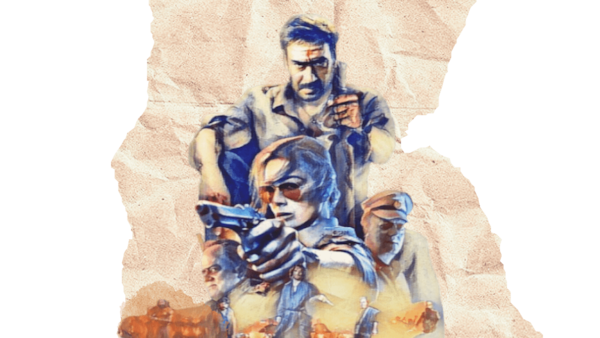Bholaa: Amped-Up Ajay Devgn Showcase With Little Logic
This is #CriticalMargin, where Ishita Sengupta gets contemplative over new Hindi films and shows. Today: Ajay Devgn's Bholaa.

Last Updated: 08.46 PM, Mar 31, 2023
AS A DIRECTOR, Ajay Devgn has never expressed much interest in the originality of a story. His debut U Me Aur Hum (2008) was an unofficial remake of the American film The Notebook (2004); Shivaay had its roots in the Taken franchise. Runway 34 (2022) was an insipid mish mash of Sully (2016) and Flight (2012). Succinctly put, an abiding theme of lack of narrative inventiveness runs across his filmography. One way to look at this is to treat it as indolence. The other way is to shift the gaze and recognise his intent as a filmmaker — which resides in using the plot as a means to serve his genuine knack for action set pieces. There are plenty of instances scattered across his short directorial career, most recently evidenced in the impressively choreographed cock-pit sequences in his middling aviation thriller.
In that sense, the only surprising bit about Bholaa, Devgn’s latest directorial venture, is not that it is an adaptation of the Tamil film, Kaithi (2019) but that it has been credited as such. It is easy to see Devgn’s interest in Lokesh Kanagaraj’s outing. Favourable commerce aside, the premise holds the clincher: a group of cops gets poisoned leaving a recently released convict to drive them to the hospital. This race against time is accelerated by two other things: the man plans to meet his daughter after 10 years, and crores worth of drugs lie in a police station, almost unattended. Most of the film unfolds during one night where, having been embroiled in the skirmish, Bholaa (Devgn) drives a truck full of drugged cops. Giving him company is IPS Diana Joseph (Tabu; referred to as Dayan by the rest).
This is not so much of a spoiler. To reiterate, narrative ingenuity is not the strongest point in Devgn’s films and I suspect, deliberately so. But the problem with Bholaa is that within this formulaic setting — a fallen man given a chance to redeem himself — the film evokes neither awe nor curiosity. Instead, watching it is an exercise in boredom punctuated with feelings of bafflement at its complete disregard for logic. Granted certain action sequences unravel with the agility of video games and are fun to watch precisely for the implausibility they hold. Like a bike literally riding off Bholaa’s nose or a man being swallowed by fire while precariously hanging mid-air. But they soon lose sheen because the purpose of their existence becomes clear: to idolise the protagonist. In fact, all plot inflections and stunts exist to exalt Bholaa. The film doesn’t stop at edifying his heroism but also uses hyper masculinity to deify him.
Every speck of logic and nuance gets subsumed in this overarching intent. Take for instance the Gajraj Rao character who is supposed to be a corrupt police officer. But the one-note characterisation and an inconsistent accent reduce him to a clownish antagonist. Ditto for Makarand Deshpande who essays the role of a convict but in essence, exists to convey to us what Bholaa is (yes, he is a concept and not a person). The only one having a ball is Deepak Dobriyal, gloriously unhinged as the cokehead drug lord.
So overwhelming is the film’s commitment to be fan service that the urgency embedded in the premise gets diluted swiftly and then all at once. It matters not that a police station, awaiting attack, is guarded by three kids and a newly transferred police officer (Sanjay Mishra). It also becomes incidental that the drugged police officers run the risk of dying if not rushed to the hospital within a stipulated time. Honestly, none of it does because Bholaa is only preoccupied with dialling up the stakes for the hero and the volume for us. Almost on cue, Tabu’s character nurses an injured hand throughout. Thankfully, a goon incapacitates her before the script can.
I reckon with the irony of pinpointing flaws in an adrenaline-riddled action thriller at a time when SS Rajamouli’s RRR and Siddharth Anand’s Pathaan have revitalised the genre. But Bholaa is neither as imaginatively adept nor half as fun as both the outings. More crucially, in its insistence to emulate high-octane sleekness, Devgn’s film misses on grasping what contributed to the films’ allure: not the invulnerability of the heroes but their fragility. There is a tiger here too but the animal slinks away in fear before it can invoke any dread in Bholaa. He gets hurt but feels no pain, needing only to smear some sacred ash on his forehead to feel invincible again. To this, I’d just say this: last time we checked, popping painkillers was a cute look on ageing superstars.
